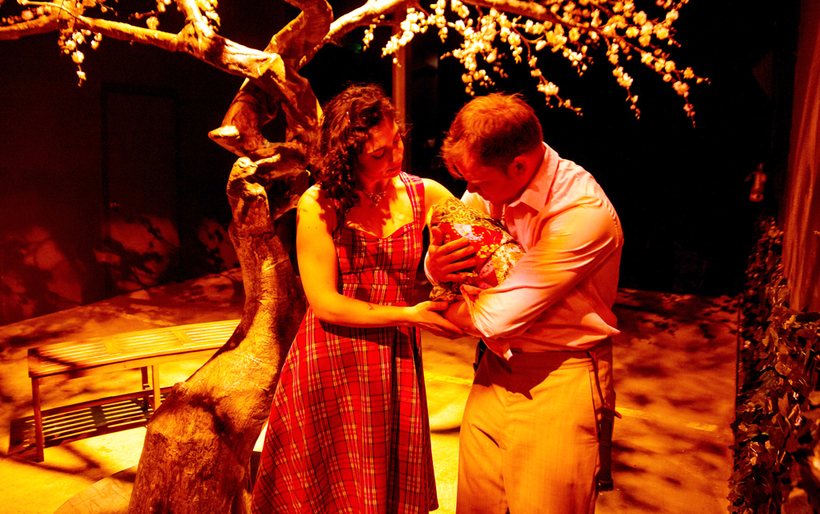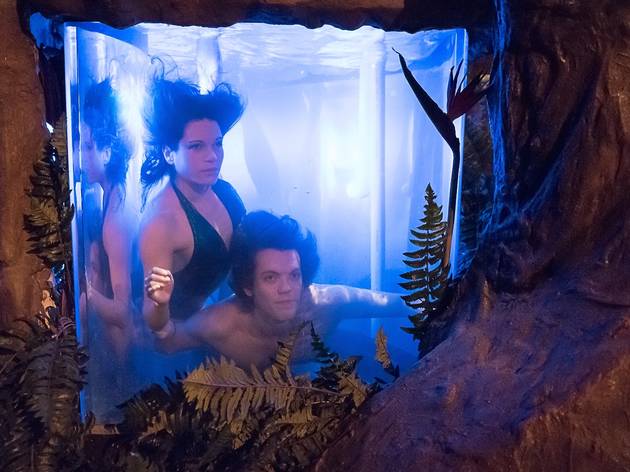Third Rail Projects takes a very different approach to immersive storytelling than Punchdrunk (see Breaking the Rules: Sleep No More). Instead of an open-world, “sandbox” experience, a Third Rail production divvies up the audience and puts them each on a set of rails, something kin to a “dark ride” of amusement parks. (I’ve always thought this company was well-named, given the house-style they developed). To keep audiences on these invisible rails, they provide an unusual set of rules.
(See my post on the importance of rules in immersive theatre here.)
RULES FOR THIRD RAILS PROJECTS
- Do not open any doors yourself
- Do not speak unless spoken to
I’ve witnessed these rules in action in their productions of Then She Fell (ongoing in Brooklyn), The Grand Paradise (Brooklyn 2016), and Sweet & Lucky (Denver 2016), and I expect the same rules will apply in their upcoming Ghost Light (limited run in NYC this summer).
Calm Down, PLEASE
When I attended Then She Fell for the first time, Sleep No More was my only point of reference for immersive theatre. That show rewards me for being a hyper-aggressive weasel and will never be surpassed in my esteem because it made me realize who I really am.

To put it mildly, this is not the skill-set needed in Then She Fell. I entered the lobby space a little late, having waited in line for the restrooms, and when I noticed folks exploring the space, I went up to the closed door and opened it.
Luckily, the nurse pounced on me, iterating the rule “not to open doors.” Which she hadn’t told me yet. (All the more reason to cover the rules with the whole audience present instead of piecemeal.) Not a big deal, but I did have the reveal of one of the more magical sets spoiled for me. Me and my lame curiosity!
My first scene also made swift work of correcting my weasel-instincts. The doctor wanted me to sit far away from him across a table. I thought that was lame and got up to get closer to him. He insisted I sit back down—I bet they can tell when you’ve been to the McKittrick. I eventually took my cues from the performers, and I highly recommend that audiences accept the more relaxed, under-active, “you’re in good hands” experience. It opens you up to a different kind of connection. Third Rail Projects is never a game, and it’s certainly not a sport. The only way you can fail the show is by failing to be present with the actors.
DEfine “Door”
Unfortunately I still had not learned my lesson when I went to see Sweet & Lucky in Denver.

I attended on the opening weekend. Again, we heard the rule not to open doors. My group had been following our main character for a while, but she yielded the set (and us) to another character, who turned off a few lamps and then promptly went through an “L shaped” passageway made of curtains. The show took place in a giant one-story warehouse, so sometimes curtains filled in for walls. PLEASE NOTE that she did not part the curtains, she didn’t need to touch them at all to go where she was going.
Naturally, I followed.
And my group of 7 more followed me.
About 15 minutes later, when we’d seen the most incredible sequence in the show (in a rather overly-crowded house), they activated the God-mic: “HOLD, PLEASE. ACTORS HOLD.” My heart was pounding, screaming “God, please no. No fire, no medical emergencies, don’t let them stop this show, I HAVE TO SEE THE END OF THIS SHOW.”
“We have a sorting error.” Eventually a very unhappy stage manager walked up to my overly-large group and asked, “Who here hasn’t seen ‘Swimming Hole?'” I raised my hand. Seven other people sheepishly raised theirs.
We had jumped the tracks.
He politely guided us to the space where we were supposed to be, but resetting a show of Third Rails’ complexity is no easy feat. If they take the show back 15 minutes, every actor has to go back 15 minutes, but so does every single audience member to the exact place where they were on the ride. Sorting the audience backwards couldn’t have been easy.

And in fact, they tried to start the show again, realized they had picked the wrong spot, and had to stop it and re-sort us all AGAIN in a totally different place (a mistake I am so grateful they caught—every moment in Sweet & Lucky matters). It wasn’t Episode 2 Cycle 2, but Episode 2, Cycle 1 where we needed to be!
Once we were all properly placed, they still had to work on going back to the right spot in the tech cues. The audience waited in place for 20 minutes in an un-air-conditioned warehouse while the tech team got things going again for us. I’ll never forget that moment. Nobody talked. NO ONE. We stuck to the rules. We believed in them. We all wanted to sustain the emotional place where we had been before the interruption. I’m grateful to everyone in that truck with me for committing to the magic so completely.
The show resumed, and it was magic. I don’t think I’ve ever cried so thoroughly.
But a simple rule in a vague situation misinterpreted by a single audience member literally broke the entire experience for all 70 people.
This is sort of on them for making the door in this case ambiguous. Are curtains that we don’t even have to touch technically doors? It’s also on the actress we followed for not clearly signaling we were to stay where we were and wait patiently for another character to guide us to where we needed to go next. (I bet she got much better at directing audiences as the run went on; I know I have.) It’s also on the story for having a moment where we didn’t have a guide and weren’t left closed off in a private room (we were in a large, open corridor).
But it’s also sort of on me and my damn weasel-mode. So let me say definitively, THIRD RAIL PROJECTS AND OFF-CENTER AND THE WHOLE CAST AND AUDIENCE OF SWEET & LUCKY: I AM SO SORRY.
This is not a conversation
Since the audience activity isn’t “where to go,” Third Rail uses eye contact, speech, and the occasional task to great affect to make the audience feel active in the story.
Most people come back from a Third Rail show recounting the profound questions they were asked. More than the tasks, the questions forge deep connections between character and audience, and the audience gains a sense of how the story relates to them. It’s brilliant. But it’s also dangerous. Hence the rule, “do not speak unless spoken to.”
They smartly recognize that too much speech in the experience would ruin the magic. You’re not often the only audience member in the scene, and if you can speak freely within your group, you might brush it off, make light, break the immersion. Enforcing silence makes us process what we see differently.
I’m not a fan of The Grand Paradise for many reasons, but no doubt my particular experience tainted it for me. You never get to choose your audience group. By bad luck, I was paired through the whole show with a talker. She kept asking our actors questions, engaging with them with tongue firmly in cheek, and making jokes—essentially making the show about her. It was a power play. She was clearly uncomfortable and refused to let the actors have any power over her whatsoever. Talking was her defense mechanism.
I was miserable. Magic wasn’t possible. I’ve never been made so wildly self-conscious, even as an actor, as “the talker” made me feel.

I partly blame the performers of The Grand Paradise for not enforcing their own rule on this unruly participant when the behavior presented itself and continued to present itself. It wouldn’t have taken that much effort to correct, and instead, it broke my show.
rules on rules
Audiences: know the rules of the particular show, and stick to them. Rules for one immersive are not the rules for another. More than just the quality of your personal experience is at stake here; everyone’s show is at risk. When in doubt, resort to passive-audience mode.
Producers, designers, actors: enforce your rules in real-time. Always err on the side of too much direction than too little. You’re doing incredible work, and you should stand ready to defend it.

